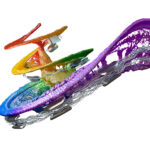
In September, we launched our latest behind-the-ear cochlear implant audio processor: SONNET 3. Some users have already gotten to test it out and let us know what they think.

In September, we launched our latest behind-the-ear cochlear implant audio processor: SONNET 3. Some users have already gotten to test it out and let us know what they think.

If you have severe-to-profound sensorineural hearing loss, a cochlear implant may be able to provide you with access to sound. But which audio processor—and cochlear implant—should you choose?

If your child has hearing loss and a cochlear implant (CI), hearing tests are likely nothing new to you! These simple tests are the best way for your audiologist or doctor to find out how well your child can hear.

Are you an older adult with hearing loss? Getting a cochlear implant may help you access sound—and enjoy a better quality of life.

Each of us has a unique cochlea. And our cochlear implant’s electrode array should be as unique as we are. Individualized cochlear implants from MED-EL bring users closest to natural hearing.

Following a diagnosis of hearing loss in a child, it is common for families to seek information and advice about how to communicate with their child and support their child’s development. Although some families that choose a cochlear implant for their child may have to wait a while before implantation, their child’s development doesn’t have to wait.